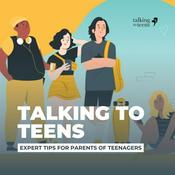Kenneth Ginsburg, author of Lighthouse Parenting, explains how parents can build lasting bonds with teens by balancing structure, trust, and unconditional love, and shares practical communication strategies.
Full Show Notes
We often hear that teens thrive best when they feel deeply understood, loved without judgment, and gently guided rather than controlled. But this balance is hard to strike—especially as teens push away, test boundaries, and become more independent. Too much freedom feels unsafe, yet too much vigilance breeds rebellion. How can we stay close, set boundaries, and respect teens' autonomy, all at the same time?
The secret might lie in what Dr. Kenneth Ginsburg calls “lighthouse parenting". Instead of hovering anxiously like a helicopter, micromanaging like a lawnmower, or retreating entirely, a lighthouse parent provides steady guidance from the shoreline. They trust teens to navigate life's waves yet remain watchful, reliable, and ready to help when needed. Done right, this blend of love, boundaries, and respect leads to children who flourish not just during adolescence, but also maintain a strong, loving connection with parents throughout adulthood.
Dr. Kenneth Ginsburg is a leading pediatrician, adolescent health specialist, and author of numerous influential books, including his latest, Lighthouse Parenting: Raising Your Child with Loving Guidance for a Lifelong Bond. Through decades of research and practical experience working with adolescents and families, Ken has identified simple yet powerful ways parents can connect with teens while also helping them cultivate strength, compassion, and resilience.
In this episode, Ken shares the key ingredients of lighthouse parenting and how to implement them practically, starting today. From smarter ways to praise and discipline, to addressing judgment and communicating more calmly, you’ll learn actionable insights you can put into practice immediately.
The Lighthouse Approach to Parenting
We start our conversation by unpacking what lighthouse parenting actually means—and why it works. Ken explains that decades of research identify balanced parenting as the gold standard: consistent boundaries combined with genuine warmth and flexibility. The challenge has always been how to achieve this balance in real daily interactions.
The lighthouse metaphor brings clarity to that balancing act. A lighthouse is stable and dependable. Instead of running out to rescue every time the waters get rough, it provides a steady beam, trusting the sailor to learn how to navigate. Likewise, lighthouse parents deeply love their child and provide consistent boundaries, but also trust teens to handle challenges, make mistakes, and learn from them. This fosters competence, confidence, and lasting closeness.
Making Communication Effective, Not Just Emotional
Ken reveals how many conversations go awry because we mistakenly use what he calls “hot communication"—reactive, emotionally-charged messages filled with judgment or exaggerated empathy. Hot communication sets off teens’ emotional brains and blocks logical thinking. On the other hand, "cold communication,” which Ken says is actually warm, calm, and emotionally soothing, allows teens to feel safe enough to open up and engage productively.
In the episode, Ken offers practical scripts for communicating in a cooler, more effective way and avoiding judgment. He shares how even subtle judgments (criticizing neighbors or yelling at the TV) make teens less likely to open up about sensitive topics. He also discusses the dangers of praising only achievements, inadvertently signaling conditional love, and describes ways to praise kids that reinforce unconditional love and openness.
Protecting By Preparing, Not Hovering
Overprotective, hovering parenting is tempting when we desperately want to keep teens safe. But Ken makes a compelling argument that true protection comes from preparation, not control. Teens who haven't practiced decision-making, conflict-resolution, or recovering from failure at home often make mistakes outside the safety of the family when stakes are higher.
Through reminders and reflection exercises, Ken shows how parents can dilute their helicopter tendencies by asking key questions about what protection actually means for lifelong success. Instead of rescuing teens from every difficulty, lighthouse parents allow adolescents space to solve problems, while maintaining protective guardrails, setting the stage for healthier independence and interdependence.
Fostering Interdependence and Strong Character
Strong families rely on mutual interdependence, yet modern society too frequently emphasizes independence and self-reliance, damaging teen-parent bonds and emotional wellbeing. Ken passionately argues we need to raise young people who not only stand strong but also know how to lean into lasting family support systems when needed.
As teens mature into adulthood, Ken believes that intentionally nurturing key character strengths—such as gratitude, humility, generosity, compassion, and responsibility—is foundational to their success and happiness. In our interview, Ken offers powerful examples of how parents can recognize and reinforce constructive behaviors to strengthen character starting from early childhood up through the teen years, ultimately shaping a purposeful, joyful adult life.
In the Episode…
Our conversation covers so many insightful ideas, and you won’t want to miss the impactful topics we discuss:
Why praise and excessive empathy can accidentally backfire
Specific scripts to motivate teens using their strengths
Understanding judgmental behaviors you might not even realize you're doing
Why cell-phone discipline isn't always the right answer, and how to handle tech smartly
Practical tips for enjoying happier, higher-quality “high yield” conversations with your teen
If you've ever worried whether your approach is helping or harming your relationship with your teen, this episode is a must. Dr. Ginsburg’s warm, insightful perspective and practical strategies empower parents to build deep bonds that last a lifetime.
Check out all of Ken’s resources at fosteringresilience.com or parentandteen.com, and don't forget to grab your copy of Lighthouse Parenting. If you loved this episode, please subscribe to the podcast and share this profound knowledge with other parents and educators you know.



